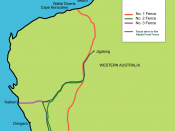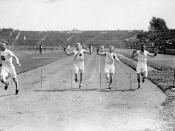"What people forget is a journey to nowhere starts with a single step, too."
Good morning Ms McDonald and the rest of the class. The Chinese proverb says that to get through the hardest journey we need to take only one step at a time, but we must keep on stepping. It's a nice way of describing the journey forwards. Moving towards a goal. Achieving something. But after reading unreliable memories, and especially after watching Rabbit Proof Fence, a film by Phillip Noyce, what I've realised is that some of the most important and life changing journeys are the ones that take you backwards. The ones that physically take you in the wrong direction but emotionally continue your journey forwards. Because it's these journeys that make you who you are. These journeys can bring sadness, and sometimes regret. But without going backwards, you can't appreciate moving forwards. And after all, it is this appreciation of moving on that drives us all as humans.
"I'm taking you back where you belong." A man in a uniform grabs Gracie by the back of her neck and drags her into his van. He's taking her back to the reserve, back to the mission and away from her two cousins, who sit watching her just a few metres away. Gracie's journey home has ended, and physically she's moving backwards. But these sorts of obstacles don't end Gracie's life journey, they just change the direction in which it's going. Journeys go in all directions; no journey is ever simple or clear cut. But journeys do change peoples lives, the physical journey back to the mission would have been one of the most traumatic events in Gracie's life, it would have scared her. Hurt her. Damaged her. But most importantly it changed her. The journeys we make, especially the ones that take us off track, are what shape us as people. These obstacles make us regret, reflect and change the way we look at ourselves. As well as being painful, sometimes moving in the wrong direction can bring people together.
In a film like Rabbit Proof Fence, it takes more than just the dialogue to show the significance of the characters journeys, and the composer of the text used a range of techniques to convey the concept of a journey. The sequence of the girls capture by police is a very powerful and dramatic start to the girl's journey. The camera jolts the audience's attention between the white officials and the aboriginal girls, as they run frantically, gripping onto their mothers outstretched arms. While watching this scene, the sounds of haunting tribal whispers, combined with loud thumping drums play in the background, while the sound of a child's heavy breathing floats over the top. There is an obvious sense of panic, heightened tension and a clear indication that a journey is about to begin. The final moment in this scene is of three little faces staring out the back window of the van that's taking them away from their home. Their journey is taking them backwards, away from their family, and away what they know and love. The composer's use of interesting techniques is one of the main reasons why this sense of a journey is so strong throughout the film.
"I think I was marked for life. I know now that until very recent years I was never quite all there - that I was play acting instead of living and that nothing except my own unrelenting fever of self consciousness seemed quite real." This is a quote from Clive James' Unreliable Memoirs, just after he tells us about the death of his father. Clearly having a parent die at a young age would have been incredibly hard on Clive James, as it would have been on any child. Death, often, is only seen as a backwards step. An obstacle. And it is, but after reading these memoirs, you can see that this obstacle and terrible period in James' life also played a key role in shaping who be would become and what he would achieve. Clive James' journey didn't run smoothly at the start, but maybe this is what made him the type of person who ended up being able to write a book full of very entertaining anecdotes and fond memories. Maybe the steps taken in the wrong direction early on in his life, whether he meant for them to happen or not, meant that he could learn to appreciate simple happiness, and his journey could continue to move him forwards.
When writing his memoirs Clive James used different techniques to show the journey of his life. His aim was to entertain his readers, he wanted to let them in on his thoughts and share what he remembers about being young, and about growing up. The use of humour was a technique the author used to allow his readers to relax and by making light of awkward moments, you could appreciate the real story behind his life's journey. James also structured his novel by writing a series of anecdotes that told of particular memories from particular times. I found it interesting that the earlier memories had a strong child like vibe to them. Stories of creating a web of tunnels under the pack patch and, I quote, "constructing a whole network of mud dams, fanatically smoothing them off and facing them with pieces of fibro, so that they resembled the photographs of the Boulder and Grand Coulee dams in my Modern Marvels Encyclopaedia." Who knows whether this is completely true or not, it is simply a strong childhood memory and James plays with his ability to only tell his version of every story. James also uses a variety of language techniques, with his figurative language allowing the reader to make a strong connection with the stories he tells. Writing that appeals to all our senses, makes us think, feel and believe deeply in what he has to say. These language devices meant that the reader always wants to know more. Find out what happens in the next part of James' journey.
So while of course the steps we take forward in life are necessary in order for us to make progress, it is an interesting idea that perhaps these steps forward would not be possible, if no steps were taken backwards. How can we feel any sort of true happiness without being able to compare it to moments of deep sadness? What we regret and what we are left to reflect upon is what binds us together as humans. Without ever moving backwards in life, how can we dream? What would there be to hope for if we only ever moved forwards in our journey through life. After watching Rabbit Proof Fence, and reading unreliable memories, two texts that really struck me as being honest versions of physical and emotional journeys, I have seen that what makes us who we are, are the obstacles we have to face. The moments of sadness, loneliness and helplessness are what allow us to finally move forwards again. The most important journeys we will face in our lives, are the ones that test you. The ones that take you in the wrong direction. As the author Anya Seton once said, "There are many trails up the mountain, but in time they all reach the top.





